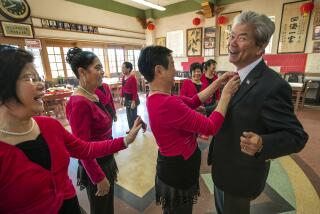Lending Support to <i> Kyes</i> : Immigrants’ Credit Associations Need to Be Encouraged--for Everyone’s Financial Health
- Share via
When Jung-Hie Park sought to collect $50,000 owed to his kye , a popular financial institution in the Korean community, he turned to California courts for adjudication. Without examining the merits of his claims, Superior Court Judge Edward M. Ross ruled in September that kyes were an “illegal lottery” whose debts could not be collected in an American court.
Although Ross’ decision may be appealed, it highlights the difficulty that American law encounters when attempting to digest foreign saving and credit institutions like the kye . In the language of anthropology, the Korean kye , the Mexican tanda , the Chinese hui , and the Vietnamese ho are examples of the rotating savings and credit association, a popular financial institution of the Third World.
In most countries where the associations are practiced, laws acknowledge financial obligations incurred by association participants, permitting them to sue for restitution of money they are owed. If Ross’ decision is sustained on appeal, California will swing into the position of attempting to suppress by law the lending associations that immigrants brought with them.
Such a course would be a big mistake.
First, the associations are not lotteries in any ordinary meaning of the term, so they cannot be illegal lotteries. Lotteries afford players only a slim probability of recouping even their original investment. In contrast, the associations guarantee all participants the return of their principal. The only uncertainty concerns how soon they get their money back.
In bidding associations like the one that wound up in Ross’ court, those who bid the highest interest obtain priority use of the common fund; the others wait, and take interest as compensation. In random-order associations, participants who have not yet collected their shares hold a drawing to determine who gets use of the funds.
Second, the associations have played, and continue to play, a valuable supportive role in the financial life of immigrant communities. These communities suffer lack of access to the financial mainstream if only because their members do not speak English or lack credit histories in this country.
The associations fill that gap, enabling immigrants to save and borrow. Additionally, the associations encourage saving, home ownership and entrepreneurship. Lacking full access to the mainstream’s labor market, immigrants rely especially upon entrepreneurship for employment.
Ross’ decision strikes at their ability to start and expand their own businesses and promises to worsen their economic distress, forcing many reluctant families onto the welfare rolls.
Finally, Americans need the lending associations too. American savings rates are among the world’s lowest, a level that starves industry of capital. The associations could rectify that situation because they encourage saving. Our inner cities need homeowners and entrepreneurs. The associations could provide them. Well-intentioned Americans commonly remark that the associations require a level of social trust that we lack in this country. Because they build this trust, the associations could strengthen the crumbling institutions that prop up our tattered social fabric. Certainly, as an institution of community self-help, the associations deserve a closer examination than Ross’ uninformed and casual dismissal.
Instead of summarily rejecting the associations, American jurists should consider how to integrate immigrant lending associations into American society in ways that minimize their risk. One possibility would be to license lending association organizers as we now license drivers, requiring certification examinations. Certified organizers would register every new association with an appropriate agency of government. Another possibility is to develop insurance plans into which certified association organizers would inscribe each club, taking a percentage of each payout for this purpose.
The possibilities are numerous. We already regulate banks and insurance companies in order to reduce user risk. Why should law not intervene on the side of a simple new way for Americans to help one another?
More to Read
Sign up for Essential California
The most important California stories and recommendations in your inbox every morning.
You may occasionally receive promotional content from the Los Angeles Times.













